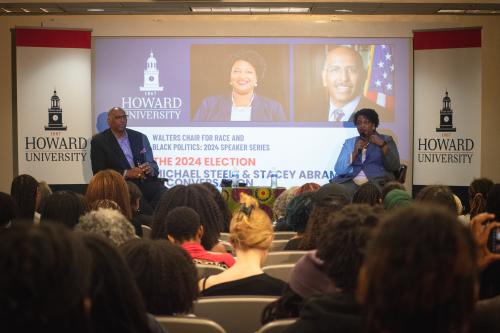On November 20, Stacey Abrams, Howard University’s inaugural Ronald W. Walters Endowed Chair for Race and Black Politics, hosted students in Douglass Hall for a standing-room-only, post-election dialogue to discuss their future after the 2024 presidential election.
Abrams worked the room with both expertise and ease as she blended students' questions and commentary while helping process their feelings.
“I am someone who believes in this country’s capacity for more, even though we've had some trouble manifesting what it should be,” Abrams said. “The conversation I wanted to invite today is really about not just what happened with the election...but I also want to talk about what our opportunities are, what are our obligations, and what our presence in this country requires of us.”
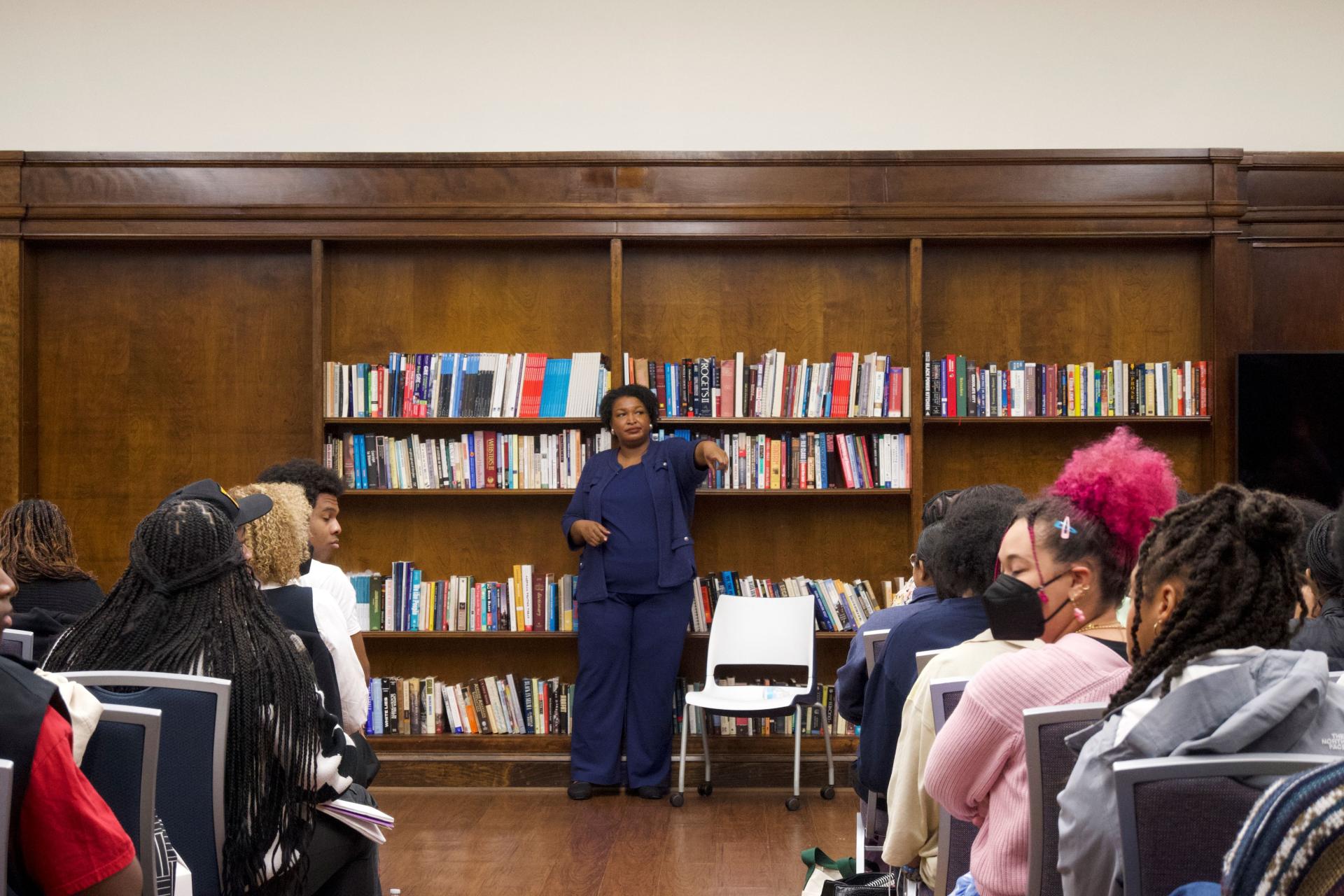
Stacey Abrams takes on questions from Howard University students in her latest installment of the 2024 Speaker Series. (Photo: Simone Boyd)
Contextualizing the Presidential Election
Student questions ranged from misinformation’s role in election cycles to secularism in political power. Abrams warned of theocracy and the ability to understand the current climate of American politics.
Much of the proposed legislation – such as Oklahoma’s education department’s push to teach the Bible, or the recently-blocked legislation in Louisiana to have the Ten Commandments as classroom posters – foreshadows the process of slowly implementing Christian nationalism into a singular, national identity.
“It’s the intent to shift America from its constitutional responsibility of not having established religion to not only making Christianity the central pillar [of American government], but make evangelical Christianity the metric for which everything is judged,” Abrams explained. “So [for] secularism, we have to push back. Black people are uniquely positioned for this, because we are among the most religious communities in the world.”
Abrams also discussed political strategies such as the dismantling of Roe v. Wade, a decision to legalize abortion that took nearly five decades to overturn. With DEI initiatives such as Title IX the presumed next targets, Abrams warned of the different attacks from various angles, such as lawsuits, protests, and Supreme Court decisions, that could slowly but surely erase progress in equality.
“They are doing their best to weaponize Title IX to eliminate [diversity, equity and inclusion], so that when there is a Supreme Court case that basically wipes out Title IX, it’s going to be a death by a thousand cuts,” Abrams said, “but the death is just as real so we’ve got to start paying attention to the smaller pieces.”
We have that obligation to show up, because the consequence of us tapping out is not they’re going to leave us alone.”
Misogynoir and Its Political Impacts
“When our right to control our bodies and protect our lives loses out to another’s demand for economic comfort, it’s exhausting and dehumanizing,” said Abrams, who spoke to the feelings of Black women who hoped to elect Harris as the first-ever woman U.S. president, citing personal experiences in her losses in Georgia’s 2018 and 2022 gubernational elections.
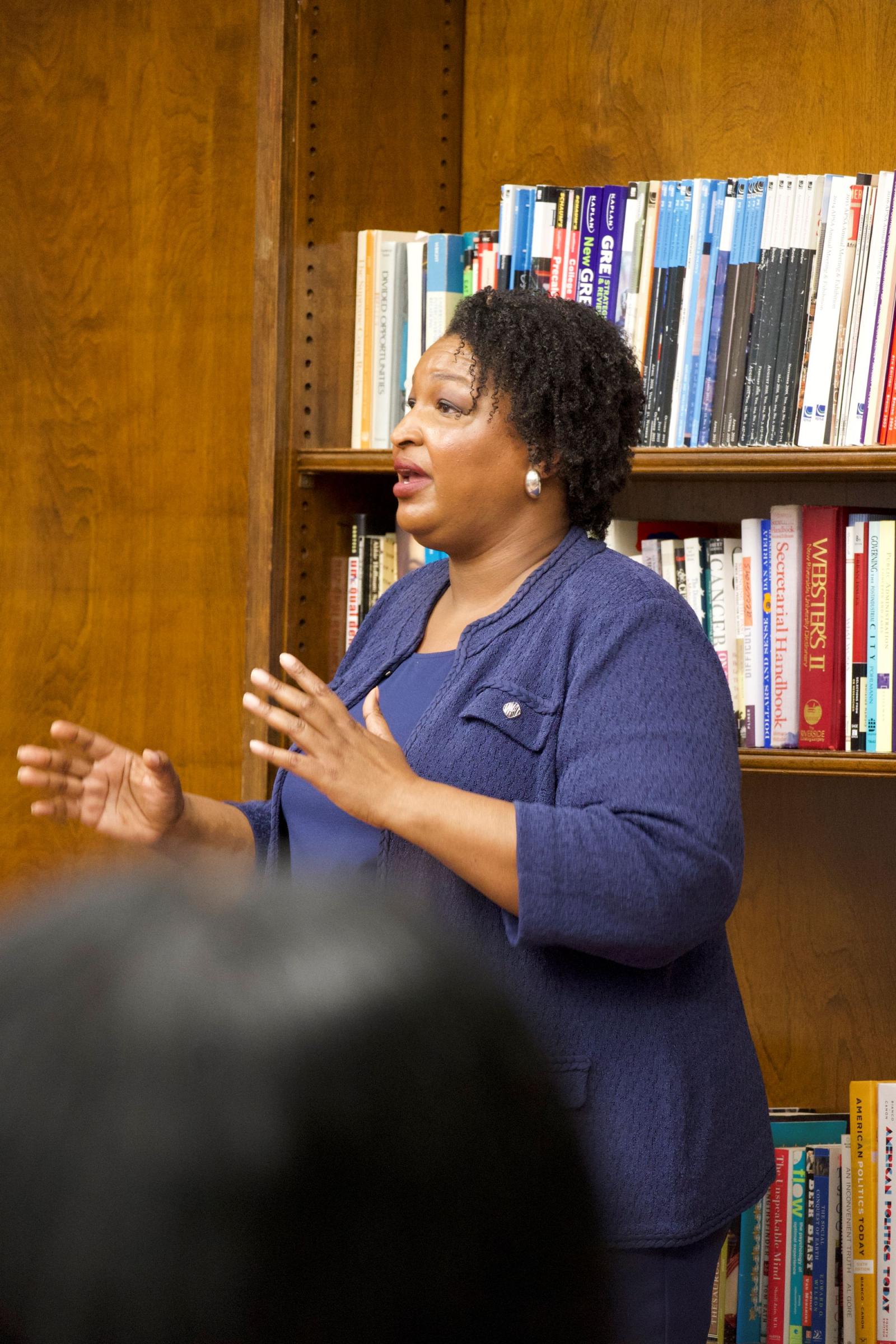
Since Election Day, Black women have expressed their disappointment in other voter blocs not getting behind Harris and her campaign. According to NBC News exit polls, 85% of Black voters voted for Democratic candidates, mirroring voting patterns since the 1960s Civil Rights Voting Act. In gender breakdown, Black women overwhelmingly supported Harris as she gained 92% of their vote.
India Long, a graduate student in the University’s School of Social Work, asked Abrams about the exhaustion that Black women feel and how to move past it.
“What advice or reassurance could you give to Black women who are feeling exhausted as we try to get people to recognize our humanity, especially when you look at the numbers of the demographics of people who showed up to this election?” Long asked Abrams. “It is a feeling of despair that I didn’t expect to have years later.”
Though Abrams acknowledged the need for rest, breaks, healing – and even disappointment – she reminded students that, as Black people are only 13% of the U.S. population, solidarity with other racial and gender groups is essential to Black liberation.
“Black women are usually the most effective fighters because we are often the most targeted victim, and I refuse to submit to my own victimization, so I keep fighting,” Abrams said. “There aren’t enough of us to change it on our own, but we understand more than anyone what the consequences of inaction or antagonism feels like.”
“You can tag out for a minute, but you’re not allowed to leave the arena,” she continued. “That’s what we have to hold. I understand the zeitgeist that says ‘Black women, we’re done, y’all do it yourselves.’ We have that obligation [to show up], because the consequence of us tapping out is not they’re going to leave us alone.”
Read More on Abrams’ Speaker Series as Walters Chair for Race and Black Politics
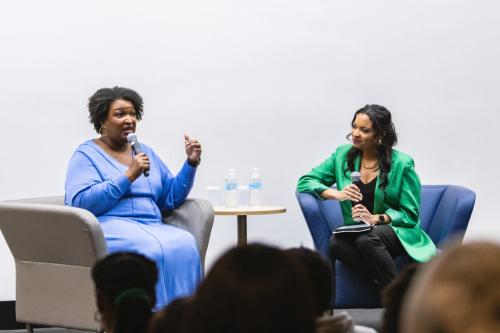
Stacey Abrams Brings Warmth and Wit to Her First Appearance as Howard’s Ronald W. Walters Endowed Chair for Race and Black Politics
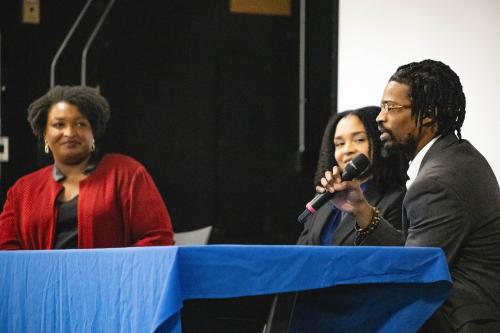
Howard Students Share Fresh Perspectives on Politics in Talk Hosted by Stacey Abrams and The Hilltop
Abrams also warned of “purity of principle,” a concept that harms the potential of coalitions who view topics from a narrow, stubborn lens with no room to expand, pivot, or reframe issues important to others. “Our conversation cannot be that, in this moment, it’s every man, woman, person, for themselves. Our conversation has to be that shared destiny requires shared investment,” said Abrams.
Coalition work was a critical aspect of Abrams’ answers on continuing solidarity post-election. It starts with everyone being accounted for, Abrams said, through government data such as the U.S. Census which can help community leaders understand the lives of undercounted Americans.
Abrams argued that using the Census to understand racial, gender, and economic lines helps clarify the larger picture of which issues should take precedence, and what the effect on those policies could have on the livelihood of those Americans who go unheard.
“Coalition is shared engagement for common objectives, but not the same objective. We’re all going to get something different out of it, but we’re willing to go together to get there. That has to be our conversation,” Abrams said.
Abrams Assigns Bison Roles and Responsibilities
While Abrams gave context to American politics today, she encouraged students to create political strategies to battle incoming policies and build for the future at-large.
“This is a generation that has not allowed anybody to tell y’all anything,” Abrams joked. “But that is your superpower: your willingness to shape language and make reality what it should be is extraordinary. If you use this time in between elections to share this conversation, to shape your narratives, to not let them win by letting them tell you who you are, that’s how we fight back.”
Students asked how to train their resistance to surrendering. Abrams encouraged the students to move past inflammatory phrases such as “identity politics” or “single voter issues” to understand how lived experience can inform and connect those with different problems. “If I call you a victim and you feel offended by it, you will be quiet,” she said.
“We have to be smarter than they are and not let ourselves get tricked into thinking that the language they use is the language that we have to adopt,” Abrams added. “If you feel like you were a victim because you were victimized, that’s not victim mentality. That’s reality.”
Abrams ended by imploring students to find community work indicative of their civic passions. She also spoke of the 2026 midterm elections, where every seat in the U.S. House of Representatives and a third of the Senate will be open.
“Your obligation after you leave this room is to pick one thing and spend the next year talking about it; writing a blog; doing a YouTube channel,” Abrams suggested. “Your second job is to find an organization – big, small, be it virtual or in person – you need to commit an hour doing something for that organization. The third thing...is start going to city council meetings and county commission meetings.
“It terrifies politicians to see people they don’t know because that means you took time to find us,” Abrams concluded. “And if you can find us, you can vote for us or vote us out.”
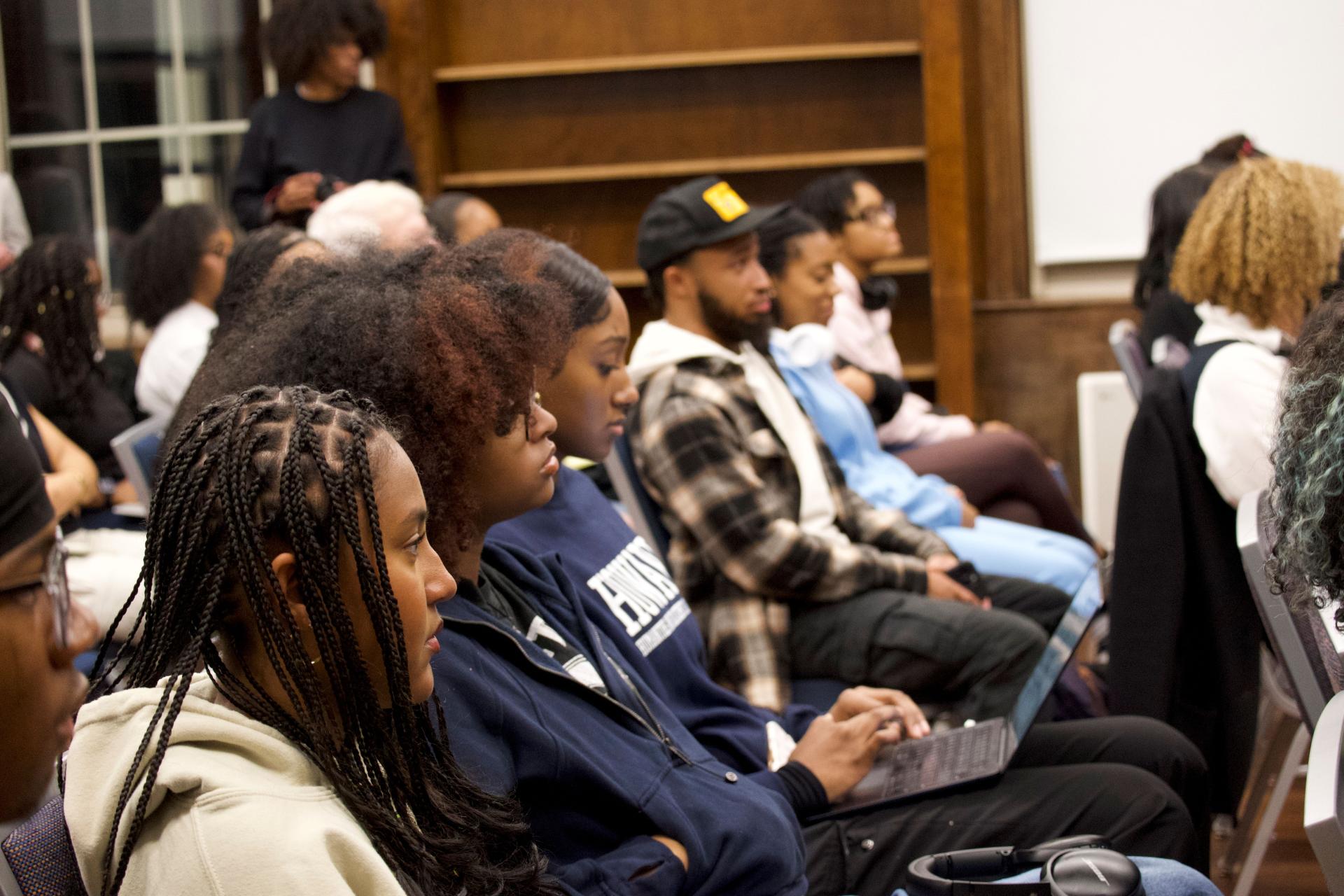
Keep Reading
-
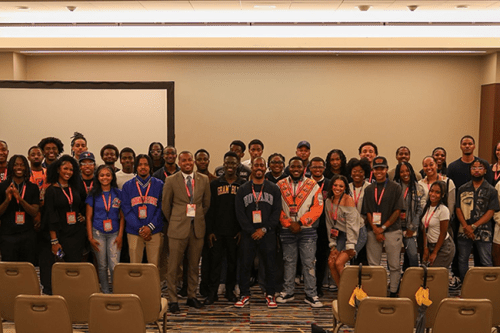 News
NewsFICO Invests in the Howard University and PNC Center for Entrepreneurship
Jan 28, 2026 3 minutes -
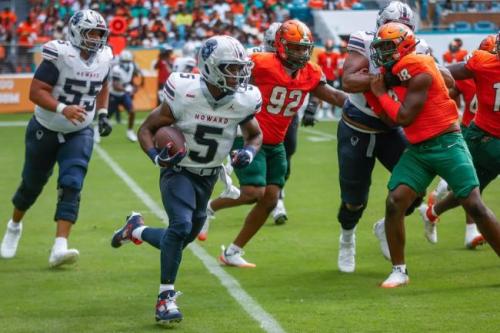 Student Athletes
Student AthletesHoward Football to Open 2026 Season on National Stage at Cricket MEAC/SWAC Challenge
Jan 23, 2026 3 minutes -
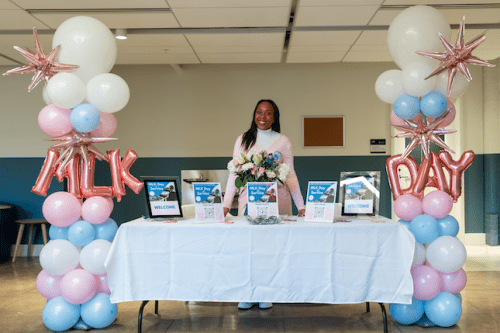 Uplift
UpliftService, Scholarship, and the Dream in Action: Howard University Inspires the Next Generation on MLK Day
Jan 23, 2026 2 minutes
Are You a Member of the Media?
Our public relations team can connect you with faculty experts and answer questions about Howard University news and events.
Submit a Media Inquiry


